Ellen and Jim Have a Blog, Too
We are two part-time academics. Ellen teaches in the English department and Jim in the IT program at George Mason University.


ASECS, Richmond: top books & authors, poetry & pictures · 19 April 09
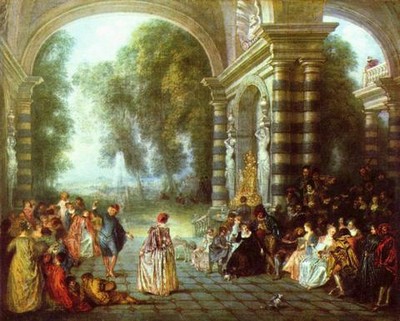
Antoine Watteau (1684-1721), Plaisirs du Bal (1717-20)
Dear Friends,
Here is the last of my 3 summaries and commentaries on my time at sessions at ASECS, Richmond. It’s a miscellany that represents the best I heard, but not necesarily my interests since sometimes I found myself going to a session simply because it seemed to me the best that was on. I did want to go to the two crowded sessions on top books & authors I attended: on Richardson’s Clarissa & on Diderot and the importance of the politics of Diderot studies from the 1940s on. Richardson’s Clarissa was a sort of unannounced star of the conference since (like Austen’s novels), papers on Clarissa were given in unexpected sessions; e.g., Jim heard one in a session on Scottish literature. I also went to two sessions on the visual arts; the first was about Watteau’s art, the second (one of my choices faute de mieux) all about stupidities in the art marketplace. The plenary lecture by John Richetti (entertaining and revealing) was on the dramatic voice of 18th century poetry.
“Samuel Richardson’s Clarissa” was on Thurs, from 9:45 to 11:15 am, & included the most memorable and important statement of the conference in a paper. This was Helen Thompson quoting Simone de Beauvoir who said that the first experience of sexual intercourse for a woman is experienced as violation since the experience of mildly (or more) penetration counts for women for real (beyond being reinforced by mythic ideas from various societies. Physiologically sex for the first time for a woman no matter what the circumstances is anywhere from unpleasant to traumatic (especially if you consider what sex for women is surrounded by in most cultures). I had pointed out in my paper on the 1991 mini-series of Clarissa, the depiction of rape was inadequate because the film-makes deliberately did not provide any visual signs of feeling of penetration (or visuals) when Lovelace raped Clarissa, only gauzed-over suggestiveness of gestures which included forced petting.
The session seemed to me important and troubling because at its core of two of the papers was a implicit attempt to undermine the feminist perspective, and during the conversation afterwards dominant members of the audience evinced a deep conservatism which would turn us back to making books declared to be the product of geniuses unassailable, with the author’s control of his text (his interpretation finally even if disagreed with) the one that really counts.
So, for example, Prof Thompson argued that Lovelace is reluctant to marry Clarissa because his masculinity will not be enough to rule over her. Marrying her will unman him, partly because he has many feminine characteristics, a reality of Lovelace’s character Richardson is at pains to emphasize: Lovelace used to be bashful, is a kind of Tiresias (this comes from Richardson’s idea he contained in himself a hidden woman or feminine nature). Prof Thompson likened Clarissa to Fanny in Prevost’s Cleveland who was stronger than the hero; she argued that Richardson was obsessed by fallen women whose stance asks for rape (we’d call this exploitation); Anna Howe’s strength supposedly clinched her case, for is not Anna masculine? She asked us to take seriously Lovelace’s idea that Clarissa is a “frightful woman.” At the heart of her argument was a desire to prove women strong and deny that physical sexuality counts. She asked & tried to answer the question, where does Richardon located sexual difference in Clarissa, she found it not in the body but in who could assert power over whom in the book based on their characters or personalities.
Thus you see Beauvoir’s idea is wrong. Prof Thompson’s argument negated any necessity for feminism, and seems to me could be used to among women (harking back to Q.D. Leavis who disliked any differential between her and men) who want a successful career to erase feminism (as not only does this hurt their cause among men, but presents women as weak or at a disadvantage ontologically).
Kathy Steele’s paper (the first of the session) was about the importance of ordinary readers, e.g., Lady Echlin (who rewrote Clarissa to provide a so-called happy ending), Lady Bradshaigh (who resisted Richardson’s interpretations of his novel), Jane Collier, Sarah Fielding. She quoted Collier in order to suggest as a general conclusion that women readers of Clarissa were and are not necessarily embarrassed by the sexual scenes. Again we had a paper which sought to say that there is no gender faultline. But the people in the audience did not say this but rather argued simply against the importance of the ordinary reader’s point of view. Who cares what foolish people think was the gist of this conservative response: one man said “did not see how readers many any difference to a book, the book remains.” So the interest in readers’ responses is misguided. The answer provided by Prof Steele was that through paying attention to ordinary readers we can find traces of other kinds of readings of books which are worthwhile.
But what was the worth of these? Well, without saying this overtly she clearly liked to prove that women do not automatically side with Clarissa, which is true enough, and are not distressed by the sex in the book. But the implications of her arguments as stated would lead to ideas like it’s not true that women as a group are upset or hurt by pornography. The implications of the audience’s objections would be that any interpretation of a text say by a film are besides the point, without authority. These would return us to staying with intelligent readers have written and keep the book absolutely superior to any film or rewriting of it in any form (or for that matter illustrations). All is secondary, tertiary. The academy is still in charge. Prof Steele did want us to pay attention to these ordinary readers and it was no coincidence all the ordinary readers she was interested in were women. She would include women in the center of readership, all the while making their forms of reading no different from men’s.
I regret to say I missed the third paper on “The Tyranny of Beauty” in Clarissa because I (foolishly) left to hear a paper on Austen’s Northanger Abbey (one which I think probably misread the book as whimsical and comic—a male reading I think). I came back to hear the end of Toni Bowers’s response to this third paper: she was saying that this third paper was a platonic argument and objected both to it and Prof Thompson’s paper on the grounds “the problems of mind and body are not resolved” by the arguments. For example, Anna Howe does marry and then will obey Hickman. Someone said in response to this that we should remember Anna Howe does not provide a place for Clarissa; is a poor reader of Clarissa’s letters and undermines Clary. Prof Bowers’ and this argument seemed to me suddenly to switch to a sociological perspective because Anna will obey Hickman as these are social arrangements which are taught and imposed on women, not the result of their bodies except that what bodies they have make them into women and thus subject to men. (So feminism is needed based on social conditions; gentle reader, pray remember feminism was not overtly brought up at any time.)
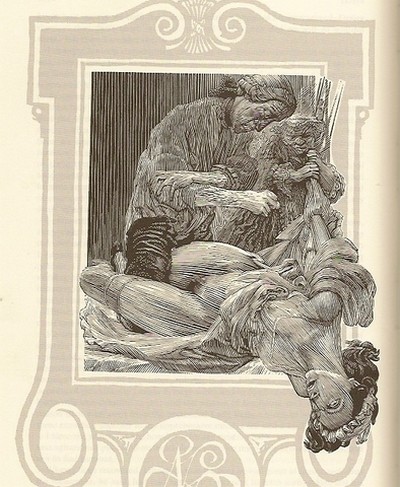
Simon Brett’s candid illustration of Lovelace raping Clarissa (from Folio Society edition)
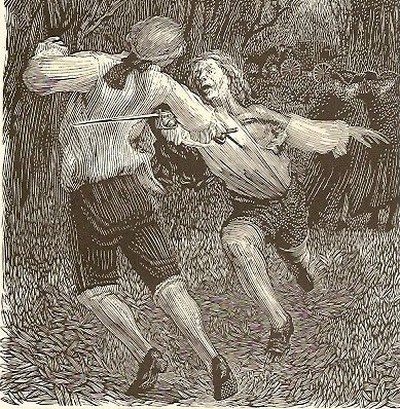
Simon Brett’s closing illustation of Lovelace and Morden duelling (he opens with Lovelace and James Harlowe duelling)
I remind the reader that Clarissa is a novel centrally about rape. On which terms will Lovelace obtain sexual intercourse with Clarissa. She can’t rape him; he wants to violate her body. It opens and closes with allowed (indeed at the time and still admired) murderous male violence, first between a male Clarissa is biologically near to (her brother) and Lovelace, and then a further off male relative, Morden, and Lovelace.
We are in a different form of post-feminism here than the one I came across in a previous ACESC in a session on Austen’s popularity. It’s not that several of the speakers were looking for a refuge from impossible hard conditions (as post-feminism was then defined), but denying any refuge is needed and looking to remake women back into men—as power-hungry, as aggressive. This is part of the movement to erase feminism, particularly (I’d say) socialistic feminism.
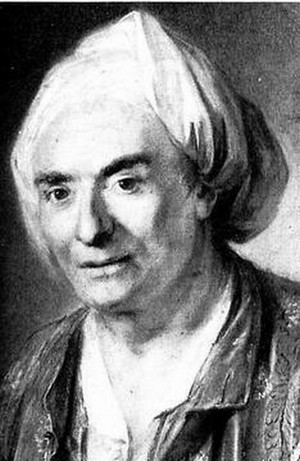
The older Diderot (1713-84)
“60 Years of Diderot Studies, Then and Now” (Thurs, 4:15-5:45 pm) had all academic star speakers. The political perspective of this session was either to defend or expose an old-fashioned liberal enlightenment point of view (found say in books like Peter Gay’s). Prof Shane Agin particularly commemorated the people who did serious scholarship on Diderot in the 1940s & 50s, a time when someone like Diderot would have been seen as subversive and Diderot’s interest in Russia a site of discomfort. Russia occupied an important place in Diderot’s “imaginary” and life because of Catherine II’s patronage of him (e.g., she bought his library more than once but never took it literally from him). Voltaire had been coopted by the socialists, & the earlier Diderot students who began the journal included anti-clerical people who tried to reinvent him as a socialist hero. In a time of aggressive materialism in the US Diderot scholars presented themselves as humanist and disinterested idealists.
I found Daniel Brewer’s “Diderot and the Ethics of Feeling” the most moving & humane paper I heard at the conference. Prof Brewer discussed Diderot’s examination of the role of sympathy in becoming an ethical writer and person. In a late work “Sur l’esclavage” (a denunciation of chattel slavery) Diderot looked to see if there was some way through art to touch the heart and change the cruel behavior of slave-snatchers, and traders and found it could not. Diderot exposed the barbarous calculations that go into slave-trading (this reminds me of a work by Barbauld protesting the mocking of Wilberforce in a vote in Parliament where Wilberforce lost), as how many raids, how many guns, how many women can one force to breed, and so how much money and property can one net or steal. Diderot wrote that “vous fremissez” (shudder) to realize that this is the thought processes of such ruthless people. Diderot’s work outlines 11 arguments against slavery, but shows that to listen to these you have to have to be susceptible to sentimental arguments and intelligent pictures.
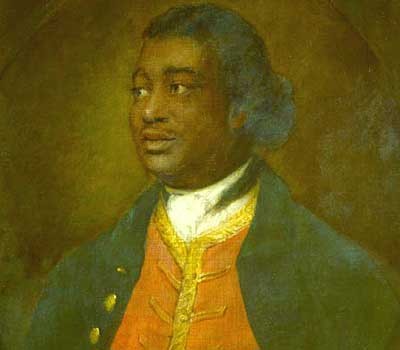
Ignatius Sancho by Thomas Gainsborough (1727-88)
Can anything emerge from recognizing such suffering or suffering itself? No. Suffering itself and sentiment is useless unless a person can respond ethically to someone else. Diderot also grappled with the dubious pleasure we take in the pains of others in art (say tragic or melancholy texts, pictures of snow)? At the end of such a discourse we see Diderot’s despair.
Julie Chandler Hayes’s paper was on a perceived “post-modern” Diderot: among other points made were arguments that the sudden rise of Diderot studies in the 1970s was the result of the rise in the number of French Ph.Ds; and that Diderot’s emotionally effective and fragmentary late styles and writing came out of and reinforced his lifelong interest in deconstructing forms (genres). It’s deeply personal writing (like Rousseau who wrote impassioned apologies for himself) which scholars tend to read backwards in the sense that we look at the earlier work through the lens of the later.
Anthony Wall’s paper was more narrowly conceived than the other three. He showed that Diderot did not like depictions of frivolous smiling and mocking or insensitive laughter in paintings; at the heart of Diderot’s virulent castigation of erotic rococo painting by, say, Fragonard, was a strongly austere spirit. Perhaps the idea here was to distance the speaker and his listeners from a viewpoint of literary studies as high, serious, and by extension elite or (heavens forfend) priggish: this last word was not uttered but the objection to Diderot’s objections comes from a desire to accept the coarse & philistine.
The conversation afterwards was unusually perceptive—a reaction I thought to the high quality of Brewer’s paper especially. I was not able to take down much because it went so quickly, with words and passages here and there in French. But one statement I did take down: at the end of Diderot’s life he had lost faith in the effectiveness of dialogues within communities, and registered how petty enemies just tormented themselves over mediocrity.
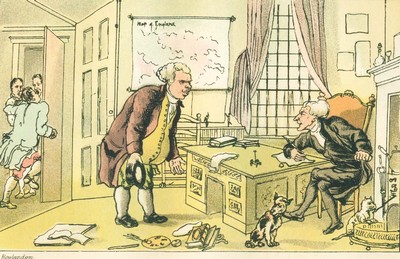
Thomas Rowlandson (1756-1827), at the bookseller (the author sells his wares)
The plenary lecture was given by John Richetti from 2:30 to 4 by John Richetti and he really took all that time. He argued that the power and greatness (and appeal) of 18th century poetry can come out only when it’s read aloud—and well. He suggested reading aloud or declaiming was a common practice in the 18th century, which went out in the 19th century. he lecture given at the EC/ASECS by Paul Hunter where he defended the heroic couplet also brought together reading aloud with the poetics of the couplet and he too said it died in the 19th century—as the ability to read spread, ownership of books, comfortable settings to do it in, and a drop in intellectual demands as reading spread. We are meant to hear strong voices, and real living conversation.
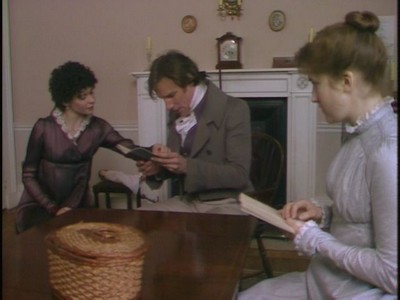
Mary Crawford and Edmund Bertram reading their parts dramatically while Fanny looks on as prompter (1983 BBC Mansfield Park)
Prof Richetti’s lecture then became a showcase for his considerable histrionic & acting talents. (Prof Richetti reads 18th century poetry aloud for groups on the Net; every other year at ASECS a group of people do an 18th century play and he often has a central role.) So he proceeded to read superlatively well & to explicate elegiac poems & passages by Dryden (e.g., “The Death of Oldham” & lines I believe from “The Hind and the Panther”), elegiac and satiric poems by Pope (e.g., “To the Memory of the Unfortunate Lady” and the Horatian ode to Arthbuthnot), the concluding stanza of Lady Mary Wortley Montagu’s (apparently) hard-to-categorize ballad to Walpole’s long-time mistress & then wife, Molly Skerrit (At length, by so much importunity press’d,/Take (Molly) at once the inside of my breast”)
“I never will share with the wanton coquette,
Or be caught by a vain affectation of wit.
The toasters and songsters may try all their art,
But never shall enter the pass of my heart.
I loathe the lewd rake, the dress’d fopling despise:
Before such pursuers the nice virgin flies;
And as Ovid has sweetly in parable told,
We harden like trees, and like rivers grow cold”
and Swift’s satirical elegy: “A Satirical Elegy on the Death of a
Late Famous General.”
“His Grace! impossible! what, dead!
Of old age too, and in his bed!
And could that mighty warrior fall,
And so inglorious, after all?
Well, since he’s gone, no matter how,
The last loud trump must wake him now;
And, trust me, as the noise grows stronger,
He’d wish to sleep a little longer.
And could he be indeed so old
As by the newspapers we’re told?
Threescore, I think, is pretty high;
‘Twas time in conscience he should die!
This world he cumber’d long enough;
He burnt his candle to the snuff;
And that’s the reason, some folks think,
He left behind so great a stink.
Behold his funeral appears,
Nor widows’ sighs, nor orphans’ tears,
Wont at such times each heart to pierce,
Attend the progress of his hearse.
But what of that? his friends may say,
He had those honours in his day.
True to his profit and his pride,
He made them weep before he died
Come hither, all ye empty things!
Ye bubbles rais’d by breath of kings!
Who float upon the tide of state;
Come hither, and behold your fate!
Let pride be taught by this rebuke,
How very mean a thing’s a duke;
From all his ill-got honours flung,
Turn’d to that dirt from whence he sprung”
Swift’s poem is superb if you read it well as dramatic verse. True poetry without hypocrisy or false beauties.
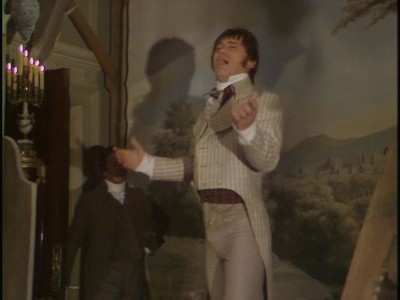
Sir Thomas’s lack of enthusiasm for another kind of performance: Yates’s declamatory nonsense as the libertine emotional Baron Waldheim
The general was a corrupt butcher who grew egregiously rich and powerful (let us call things by their right names as Anna Barbauld would say), and gave rise to many other rich and powerful relatives as well as more than BBC one mini-series costume drama: John Churchill, later Earl of Marlborough.
Prof Richetti included Lady Mary really to have a woman, and he briefly surveyed Roger Lonsdale’s volume of 18th century women’s poetry (an Oxford), to ask if womens’ poetry is instrinsically different from men’s. He did not answer his question, but rather went to look for poetry in Lonsdale’s volume which resembled those by men he was discussing. So while acknowledging his methodology could be flawed, he (in effect) treated women’s poetry with the same norms and values he was using for men’s. In a review I wrote, I argued that the choices of Lonsdale’s volume come out of a male perspective, which is for example out of sympathy with the sentimental and vatic-mandarin of women’s poetry. Joyce Fullard’s British Women Poets, 1660-1800, is a volume which comes out of a woman-centered feminine aesthetic (picking subgenres women preferred) & stands as a contrast to Lonsdale.
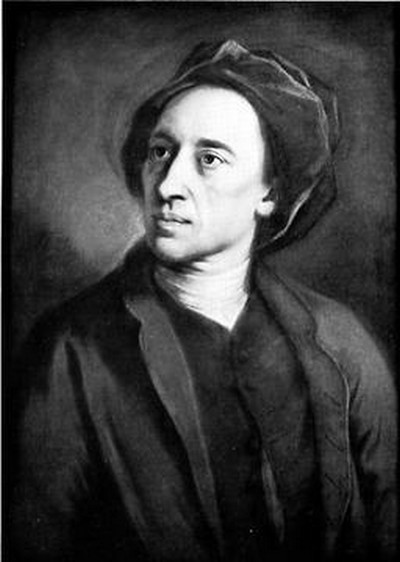
Alexander Pope (1688-1744) by William Hoare (1739-1784)
On Saturday there was only one session where people spoke about my interest (the second part of John O’Neill’s panels “the 18th century on film), so I went along to sessions where I hoped to learn something about what I like to read for sheer enjoyment, as a hobby: art history. Between 8 and 9:30 am, I listened to speakers who were part of a panel called “Theater & Painting in the Long 18th Century.” The person scheduled to speak on “role-playing and masquerade” (of interest to me since my paper on Clarissa) didn’t show up, and of the other two only Josephine Touma’s “From the Playhouse to the Page: Visual Sources for Watteau’s Theatrical Universe” made real sense to me from what I knew previously. Ms or Prof Touma argued the source of Watteau’s architectural and theatrical elements is to be found in a tradition of prints of stage-looking pictures and prints of stage scenes. She suggested that Watteau’s depiction of parks, trees, natural landscape (including the famous Embarkation for Cytheria) is shaped by an archetype of staging. Watteau’s figures are tightly confined in a narrow space, and private scenes between pairs of people, with convincing interactions emerge, e.g., as in this detail of the famous Embarkation for Cythera:
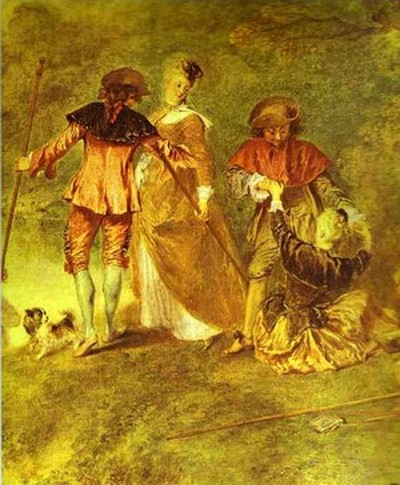
Or this enigmatic scene:
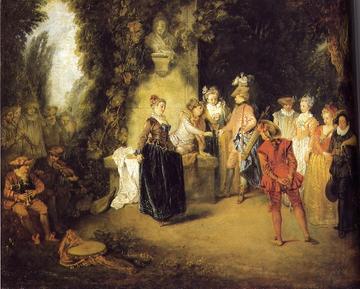
Watteau, a French theatre scene
I liked this very much for it seems to me that later 20th century film adaptations of high status novels use the same trope, from Frear’s and Forman’s Les Liasions Dangereuses
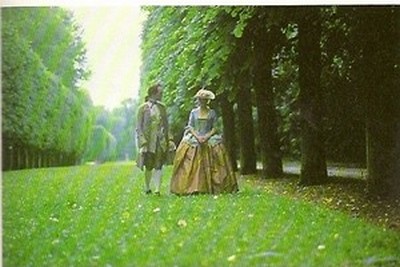
A strongly stylized moment from Frears’s 1988 LLD
to many of the Austen movies.
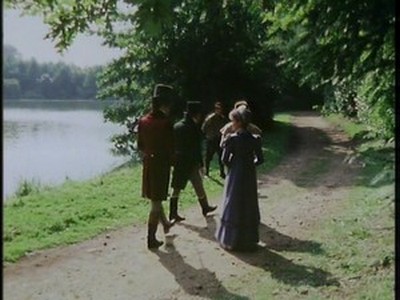
Landscape as Stage in the 1979 BBC Pride & Prejudice
after the intimate moment, close up for us:
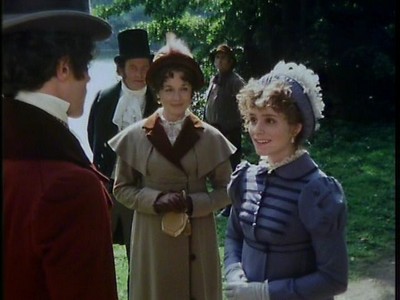
The last session I went to (before heading for the train home) was entitled “Thematic and Solo Art Exhibitions in the Long Eighteenth Century” (2-3:30 pm). One paper was about how single-painting shows became a useful tool for artists in the UK and US to promote their careers and make money; for the second paper, I didn’t know enough about Philip James de Loutherbourg to appreciate properly how his use of light and mechanical effects influenced academic (e.g., Reynolds) ideas about exhibitions and pictorial-landscape art.
The third paper, Wendy Wassyng’s “A ‘Tour of Painters:’ Visits to Artists’ Studios & Galleries in London” had a basic informativeness from which anyone who knew anything about human nature, art, and the art marketplace could profit. She first showed how many painters kept an extra room in their houses to display their art, and that it was a custom for middle to upper class people visiting a city where art was known to be done to visit such places. As customers they could buy or commission paintings. She outlined and quoted from diaries and letters of people who went such rounds. The listener learned of how painters in later 18th century England tried to make money by selling their stuff in rooms next to their studios and (as recorded in private letters) the stupid unappreciative complacent petty cliched talk that passed for conversation at such moments, which such painters probably had to listen to, endure. Painters so visited and paid to make paintings of family members and friends included Joshua Reynolds, Angelica Kauffmann, George Romney, Osias HumphreyWhat diaries reveal of how people behaved and talked when they went round to artists’ studioes presumably to buy (or so the artist hoped). I did love Ms or Prof Wasyng’s last line about how artists did want real appreciation, but had to be content with money-backed condescension instead.
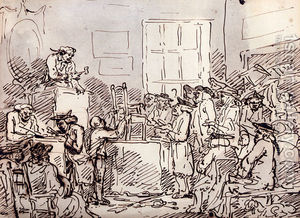
Thomas Rowlandson, A Furniture Auction
It made me sympathize more strongly with landscape art than ever.
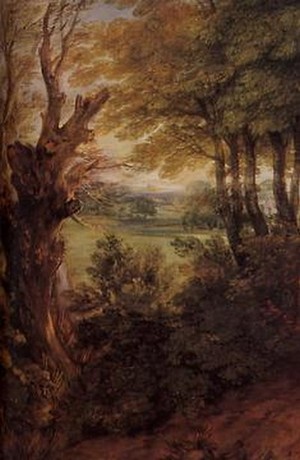
A landscape by Gainsborough
Listening to this paper made me think back to the Clarissa session I had heard early on Thursday. It seems to me we should listen to what the average reader and viewer writes down about their understanding of works of art. This makes visible discussable, analyzable whateverl meanings they take away from such works. However, we need to discriminate between points of view that are intelligent, informed and insightful (say Barbauld in 1804 on Richardson in her introduction to her edition of his letters and in 1805 her history of the novel where she introduced her edition of a canon of British novelists) and those who have missed the point of the text, have read it wrong, cannot think out positions at all consistently.
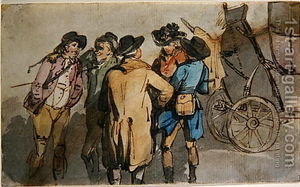
Rowlandson, a group of figures
And so to bed,
Ellen
--
Posted by: Ellen
* * *
Comment
- Addendum: Richetti during his lecture asked for other passages beyond the ones he cited in the lecture—and he had a couple of examples of people reading aloud for a long time, declaiming. I know that Austen played Lady Candour in an amateur performance of School for Scandal and of course the Bertram boys read aloud to their father as boys and Henry Crawford begins to win Fanny’s heart by his histrionic abilities over Henry VIII.
All this to offer an example: in McCarthy’s superb biography he tells of a happy time Anna Barbauld had when she travelled with a female pupil (she was like a male going on tour with pupils) through Scotland, and Scott complimented her later on that what he heard about her performance made him a poet (exaggerating I expect, but perhaps he did see the social capital gain one could get this way as well as pleasure):
She was visiting the home of Dugald Stewart, and had bought William Taylor’s translation of the romantic ballad, “Lenore” To an evening gathering of Stewart’s family and friends she read aloud 264 lines. She was promoting Taylor too. McCarthy writes:
"the company who listened to her may be presumed connnoisseurs of the art. The company, Scott wrote, was “electrified” by her reading. Annother who heard Barbauld read aloud elsewhere ranked her with Sarah Siddons, so her performance must have been fairly stunning. Scott himself was not present and only heard of it afterward from one who was and who still remembered parts of the poem, especially a refrain:
This was a rare bright spot in her life at this time. We all know how much such moments mean. Among other things she visited Buchan probably around 22 Septemmber, the date of an annual festival honoring the birthday of James Thomson that Buchan led at his estate at Dryburgh Abbey, a Gothic ruin on a bend of the river Tweed. Buchan promoted nationalism, and Scots poetry and was “an ardent advocate of women’s education and a passionate believer in progress and reform; he deplored British “political insanity” and credited the new United States with every imaginable virtue. His favorite boast was his correspondence with George Washington.
Tramp, tramp, across the land they speede,
Splash, splash, across the see:
“Hurrah! the dead can ride apace;
Dost feare to ride with mee?”
Barbauld did not meet Scott till 1815, when he visited London as a literary lion. The first thing he said to her -- after learning that the woman he had just snubbed as Mrs. “Barbo” was really the eminent Mrs. “Barbold”-was that what he had heard about her performance of “Lenore” that evening in Edinburgh “made him a poet."
This whole scene of this Scottish ramble shows the cheering nature of social life (much valued in 18th century poetry). As Buchan ushered Barbauld and her companions, Miss and Mr. Wynch, along a scenic path he had laid beside the riverbank, a gust of wind blew her hat into the Tweed. Buchan waded in, retrieved the hat, and presented it to her: “Madam, it would have been no easy matter here in the country to have found annother such hat, but to fill it in the same manner would require half an Age.” Buchan was a student of hats and estimated people’s genius by their hat size; but it is doubttful that Barbauld wore a large size, being a small person. His bon mot passed quickly into circulation. When she arrived home, in October, she was amazed to find that Mr. Barbauld had already heard “the adventure of the hat.”
She writes a happy poem to the Wynches (her pupil and his father) too. Another time.
Ellen
— Elinor Apr 20, 5:37am # - Ellen,
Sorry if this is the wrong place to put this, but I wasn’t sure if this justified an email, and the posts which are relevant have closed commenting. Please let me know if you’d rather a different place to put such info.
But anyway, PBS/Masterpiece/Barnes and Noble are having a Q&A with Andrew Davies this week during the airing of Little Dorrit, and I asked him about the burning of Radcliffe. My question is here, and his response here. While I don’t think he completely exonerates himself from the charge of anti-reading or anti-female authors/readers, I do think it’s not intended as quite the blanket “women writers and readers are evil” as it might first appear to be.
Just thought it might be interesting!
— I. Miller Apr 20, 10:10pm # - Dear Ian,
It’s fine. Jim closes the comments on old blogs within two weeks because if he didn’t, we’d be inundated with spam. I am grateful for comments and in general on about Austen and movies all the time. This blog has two stills from the ‘79 P&P.
I went over to where you linked in your question and Davies’s reply with I reprint here: “Catherine’s book burning (which is a bit extreme) is her condemnation not mine. She’s angry with the book because it encouraged her in silly fantasies.”
As you say, this is not quite adequate. He does admit the scene is extreme, but his use of the term “silly fantasies” shows his reponse to Radcliffe’s book. The ugly fantasy of the film was from The Monk and that’s not burnt. Beyond that Austen and Tilney both praise Radcliffe highly; for my part I feel Austen had in Radcliffe a model for writing subjective mood prose.
He writes much more on his Little Dorrit which I’ve seen about half of. It too is strongest on the human dimension, or psychologies he supplies the characters with. I feel he improves on Dickens’s heroine a lot—particularly in conveying her frustration, humiliation and implicit shame for her father. Courtney is just brilliant as the sordid selfish petty man. I have watched about half-way through Ezhard’s earlier Little Dorrit: it’s deeper in feel since she cuts out so much of the plot and many characters so she can concentrate on the central ones, & I like it; it’s much less Dickensian in humor and melodrama, but then I’m not one who loves these things.
Good to hear from you. I’ve been remiss in not going over to livejournal the way I used to.
Ellen
— Elinor Apr 21, 1:06am # - Completely agree about The Monk and the blame it should bear in Davies’ adaptation. I’m not sure, though, that he means to say that Radcliffe is only or primarily “silly fantasies.” His comment struck me more as Catherine’s response – the response of immature reading – rather than a serious statement about Gothic novels read by a more discerning reader. But it’s a fine point, and I was just as glad to have it cut out in the American release.
I’ve loved Little Dorrit especially seeing so many fine actors (either for the first time, like Claire Foy, or in completely different roles, like Matthew Macfadyen or Tom Courtnay). It may be that Little Dorrit is one of the few Davies doesn’t steal from the previous one, since he says he didn’t watch it before adapting it. However, I’ve noticed bits that he’s stolen from himself!
Glad this was an okay place to post – I was very excited Davies was accessible, and thought you might be interested in his responses.
— I. Miller Apr 21, 3:04am # - From Clare:
“Thanks for the notes from the conference. I must be honest in that I found the papers on Richardson's Clary puzzling. I can see that some women would not identify with Clary, but some of the interpretations seem outré.
In contrast, I loved the section on Diderot. I must read The Nun again.
Clare”
— Elinor Apr 21, 5:08pm # - IN response to Clare, the interpretations of Clarissa and its heroine were strained. There was an attempt to take out the body (so to speak) in order to make a strong heroine. Clarissa’s strength is in her mind, but we see how little power her mind has over others finally (she is raped, she is pressured into marrying first Solmes and then the rapist, Lovelace has the gravitas of the male and upper class heir), and she has nowhere to exist after she is bodily violated.
I do think Anna is strong but then we are in the novel to see Hickman as weak (too sensitive), not personally able effectively to exercise the patriarchal position he is given.
E.M.
— Elinor Apr 21, 5:14pm # - From Nick:
“The blog was as ever fascinating. It seems as though some lit criticism is heading backwards rather than forwards though. I certainly thought that ‘it is only the artists/writers intentions that matter’ line was long since dead and buried. Just seems so sterile to me as a sole criterion.”
— Elinor Apr 22, 11:34am # - Clare, the recent activity by some powerful groups in government to expose and then punish those who tortured others, reminds me that I left out a portion of Brewer’s talk. He said that Diderot’s conclusion was that since there are human beings whose sympathy we cannot appeal to when it comes to enslaving people (and treating them terribly ) for their profit, we must then pass strong laws forbidding it, and punish those who defy the law. He said the punishment must be effective and done.
Those who are arguing that even if we cannot reach those at the very top who argued the torture (Bush, Cheney, their direct henchmen), we can and must reach those who ordered it more directly and did it. The purpose of this is (in Voltaire’s ironic language from Candide “Encourager les autres.” That is, if we don’t punish those who did it in a just and controlled manner (not going overboard either), the next time we get a president in like Bush it will happen again, or even if no one has heinous comes, we will have it flourishing in secret.
The line of argument is Diderot’s logic out of despair. As we know in order to end slavery a war was fought.
Ellen
— Elinor Apr 25, 8:05am # - I’m with Brewer, absolutely. However, in a rich, modern democracy the punishment should reach the top, otherwise the disillusion with politics will only grow, both in Europe & the US.
Clare
— Clare Shepherd Apr 26, 4:37pm #
commenting closed for this article
